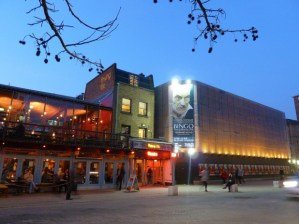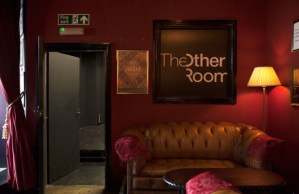Review: My Name Is Rachel Corrie (Young Vic)
JMK Award-winner Josh Roche directs this play edited by the late Alan Rickman and ”Guardian” editor Katharine Viner
Rachel Corrie was a 23 year-old American activist killed by an Israeli bulldozer on the Gaza Strip in 2003. A fresh-faced blonde, she became a symbol in the midst of that struggle – a martyr to Palestinians, then facing a concerted campaign of demolition, but, for many Israelis, a naïve interloper. She remains a contested figure even today. Outside the Young Vic, a protester pushes a leaflet my way, offering "the truth about the real Rachel Corrie."
My Name is Rachel Corrie, first seen two years after her death, makes much the same claim. Edited by the late Alan Rickman and Guardian editor Katharine Viner, the play darts through the diaries Corrie wrote from the age of 12 upwards. The form makes it potent – nothing if not honest. Diaries, being private, have no reason not to be. They’re personal, not political, and whatever anyone makes of her standpoint, there’s no denying what Corrie witnessed in Palestine – children growing up surrounded by shellfire, farms razed without warning, soldiers shooting at will.
Edited and staged, however, diaries become both public and politicised. Corrie’s do more than relay events from Gaza. They introduce us to the person behind the headlines – a superb writer with an easy style, an independent thinker and a deeply empathetic, engaged young woman. As we watch her growing up in Washington state, rattling off dead writers for dream dinner parties and working through teenage crushes and heartaches, she emerges as a thoroughly sympathetic figure long before she gets to Gaza. This being her diary, that’s hardly surprising, but the play couches the entire conflict in Corrie’s terms – a young white woman walking towards gunfire, standing up to injustice.
The brilliance of Josh Roche‘s JMK award-winning staging is that it balances the two – honouring Corrie’s personal politics and experiences while resisting a play that wants to politicise both. Erin Doherty‘s Corrie is a breezy, quirky presence, sometimes blustering, sometimes clear-sighted, but never anything less than likeable. She’s also clearly privileged enough to pick and choose her causes and construct her identity. We see her trying on different outfits, but also shaping her environment, controlling the stage lighting or selecting a soundtrack on her portable stereo. Doherty’s Corrie is, for the most part, in control of a story that isn’t necessarily hers to tell. A crash helmet becomes a symbol of relative safety; a high-vis jacket, a mark of her political visibility. Doherty speaks into a microphone; Corrie’s words are amplified.
Where the Royal Court production sat Megan Dodds’ Corrie on a mound of rubble, and the text itself took us back into her cluttered teenage bedroom, Sophie Thomas’s design is an abstraction of both. A wooden stage seeped in red paint, it suggests both pink sunsets and pooling blood. Out of it sticks a slab of floorboards, 15 foot tall, that’s both a bedroom wall, stapled with sketches, and Gaza’s concrete slabs. Sometimes it’s a headstone, sometimes the World Trade Centre, and sometimes the bulldozer barring Corrie’s way. The image is of an individual dwarfed by world events, but nonetheless capable of sizing up to them. That’s the charge that sticks as you exit – however you see the world, whatever you stand for, what are you doing about it?
My Name is Rachel Corrie runs at the Young Vic until 26 October.















